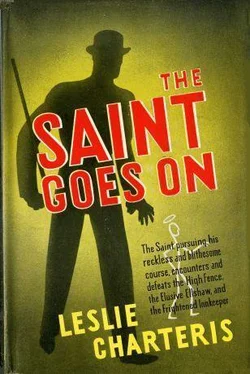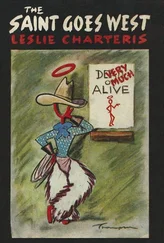Simon Templar stood in the half-open doorway and saw the motor-cycle whip round the corner and vanish with its engine roaring. He was aware that Hoppy Uniatz was breathing heavily down his neck, making strange grunting noises in an ecstasy of impatience to get past him.
"Lemme go after him an' give him de woiks, boss," he was pleading. "I'll get him, sure."
The Saint's fingers were still curled over the butt of his own gun, which he had not had time to draw.
"You're too late, Hoppy," he said quietly. "He's got the works."
He stepped back into the hall and moved aside to let Mr. Uniatz look out. A small crowd was gathering round the spread-eagled shape on the corner, and the wail of a police whistle drifted faintly over the rumble of untroubled traffic. Simon closed the door again.
"So ya had him on de spot," said Mr. Uniatz, with proper admiration. "Chees, boss, you got it all on de top storey. Howja know he was gonna take a powder?"
"I didn't," said the Saint evenly, and went back up the stairs to Patricia.
He knew of nobody who would mourn the passing of Sunny Jim for long, and his own regret for the untimely accident was as sincere as anyone's.
"We'll be moving, kid," he said. "Sunny Jim has clocked out."
"Did you shoot him?"
He shook his head.
"That was the mistake Hoppy made. But I hadn't any reason to. There was a bloke waiting outside on a motor-bike, and he got him — it may have been the High Fence himself. I thought this address was our own secret, but somebody else seems to have got on to it. So we'll move on." He lighted another cigarette and trickled an airy feather of smoke through his lips, while Hoppy came plodding up to join them; and she saw that his blue eyes were as bright and cold as steel. "We've lost our insurance policy, old dear. But there may be something better than an insurance policy at the Kosy Korner; and I'm going to find out what it is if I eat there till I'm poisoned!"
Of the millions of people who read of the vanishing and double murder of Sunny Jim Fasson at their breakfast-tables the next morning — the ingredients of the case were sensational enough to give it a place on the front page of every newspaper that had a front page — a certain Mr. Clive Enderby was not the least perturbed.
Nobody who saw him going to his office that morning would have thought it. Nobody who looked at him with a cynical eye would have suspected him of ever being perturbed about anything. Nobody would have suspected him of thinking about anything. Pottering down the steps of his old-fashioned apartment in Ladbroke Grove, he looked like a typical middle-aged British business man.
He was rather thin and long-faced, a little stooped about the shoulders, a little flat about the feet, a little under-exercised about the stomach. These things were not positive characteristics, but rather vague and diffident tendencies: to have been positive about anything would have been bad form, a vulgar demonstration in which only temperamental foreigners (a sub-human species) indulged. He wore a respectable bowler hat, and, although it was clear and warm, a dark overcoat and brown kid gloves, because the calendar had not yet announced the official advent of summer. He rode to Holborn Circus on a bus, ingesting his current opinions on every subject under the sun from the Morning Post . No one would have believed that under the crown of that respectable and unemphatic derby he held the key to a riddle that was working Scotland Yard into a lather of exasperation.
From Holborn Circus he walked to Hatton Garden. His office was on the third floor of a sombre building just off that most unhorticultural preserve, where the greatest jewel business in the world is conducted by nondescript men at street corners and over the tables of adjacent cafes and public houses. It consisted of no more than a couple of shabby unpretentious rooms, but a surprising volume of trade in precious stones passed through it. For three hours Mr. Enderby was fully occupied, in his slow-moving way, poring over an accumulation of letters and cables from all parts of the world, and dictating stodgy replies to his unattractive secretary, who could have coped efficiently with two hundred and fifty words a minute but in Mr. Enderby's employment had never been strained to a higher average than ten.
At a quarter past twelve he had a telephone call.
"Where are you lunching?" asked the voice.
Mr. Enderby showed no surprise or puzzlement at being bluntly addressed with such a question by a caller who did not even announce his identity.
"I thought of going to the Kosy Korner again," he said primly.
He had a voice rather like an apologetic frog.
"That'll do," said the receiver, after a moment's thought; and a click terminated the conversation without further ceremony.
Mr. Enderby put down the telephone and ponderously finished dictating the letter in which he had been interrupted. He got up, put on his bowler hat and his superfluous overcoat, and went out. On his way through Hatton Garden he stopped and bought two stones from an acquaintance on the pavement, wrapping them in bits of tissue paper and tucking them away in his waistcoat pocket.
The Kosy Korner is one of those glorified tearooms run by impoverished dowagers of stupendous refinement with which the central areas of London are infested. At the time when Mr. Enderby arrived there, it was already well filled with an assortment of business men, clerks, stenographers, and shop assistants, all apparently yearning after a spot of Kosiness to stimulate their digestion of that exquisite roast beef and boiled cabbage which has made English cooking famous among gourmets the world over. Mr. Enderby filtered through the mob to a groaning coat-rack already laden with the outer garments of other customers, where he parked his bowler hat and overcoat. He sat in a vacant chair and ate his meal as if it were a necessary evil, a dull routine business of stoking his interior with the essential fuel for continued functioning, reading the Morning Post between mouthfuls and paying no attention to anyone else in the place. He washed the repast down with a cup of tea, folded his paper, paid his bill, pushed two coppers under the plate, and got up. He took down his hat from the rack and sorted out his overcoat. There was a small parcel in one side pocket, as he felt when he fished out his gloves, which had not been there when he hung up the coat; but even this did not make him register any surprise. He did not even take it out to see what it was.
Back in his office, Mr. Enderby spoke to his secretary.
"I had a large order at lunch for some stones to go to America," he said. "They will have to catch the Oceanic tomorrow. Will you ring up the insurance company and make the usual arrangements?"
While she was at the telephone, he broke open the parcel from his overcoat pocket and spilled a small handful of diamonds on to his blotter. He looked at them for a moment, and then turned to the safe behind his desk. It was a comparatively new one of the very latest design, a huge gleaming hulk of steel which would have seemed more at home in a bank Vault than in that dingy room. He set the two combinations, turned a key in the lock, and swung back the massive door. There was nothing on the shelves but a couple of cheap cardboard boxes. He took them out and tipped their contents on to the blotter also, submerging the first sprinkle of diamonds which he had put down. A solid heaped cone of glittering wealth, diamonds, emeralds, sapphires, and rubies, iridescent with all the colours of the rainbow, winked up at him.
"That will be all right, Mr. Enderby," said his secretary. "They're sending a man round right away."
Mr. Enderby nodded, and dragged his eyes away from the pile of jewels to glance at the cheap tin clock on the mantelpiece. He was not, as we have seen, very interested in food; but for more years than he could remember he had had a passionate interest in drink. And the hour had not yet struck when such satanic temptations are officially removed from a nation which would otherwise be certain to spend all its afternoons in drunken debauchery.
Читать дальше












